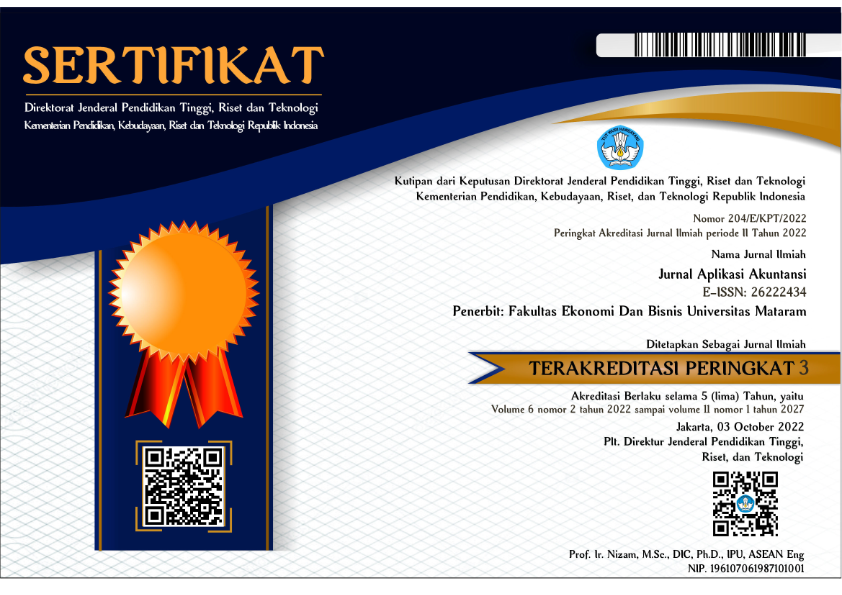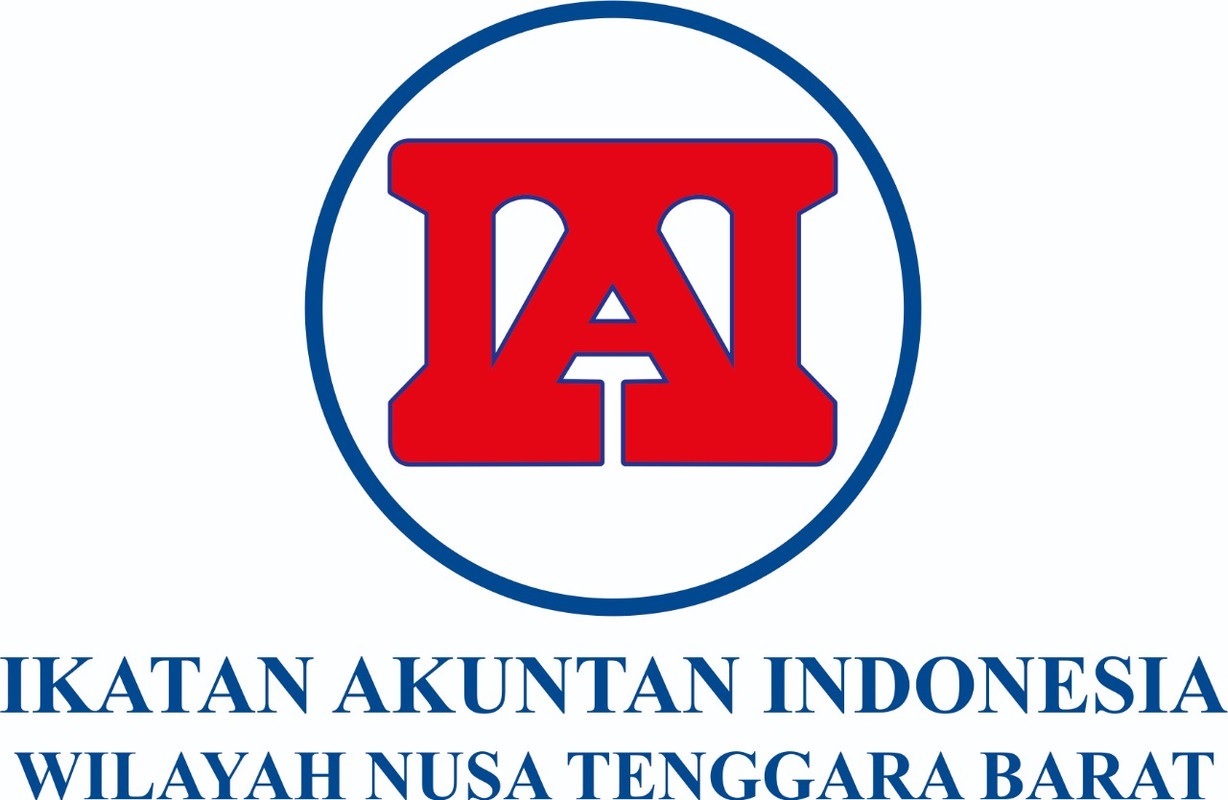PENGUKURAN PRAKTIK GREEN ACCOUNTING DALAM MEWUJUDKAN KEBERLANJUTAN USAHA (STUDI PADA INDUSTRI PERHOTELAN DI KOTA DENPASAR)
DOI:
https://doi.org/10.29303/jaa.v9i1.443Keywords:
green accounting practices, organizational size, business sustainabilityAbstract
The hotel industry in Bali Province faces risks related to dependence on tourism, which can harm the environment and local communities. This research aims to understand the implementation of green accounting practices in achieving business sustainability, especially in the hotel industry in Denpasar City, Bali Province. Apart from green accounting practices, to achieve business sustainability, it is also essential to consider the dimensions of organizational size as influencing regulatory factors or moderating variables. The population in this study consisted of Head of Accounting who worked in five-star hotels in Denpasar City, Bali Province. Sample selection used a saturated sampling technique, which was included in the Non-Probability Sampling category. The quantitative data is obtained through a questionnaire with a Likert scale as a measurement tool, which the respondents fill in. The collected data was then analyzed using simple linear and moderated regression analyses (MRA). The regression analysis results show that implementing green accounting practices has a positive and significant impact on business sustainability. However, simultaneously, organizational size does not significantly influence the relationship between green accounting practices and business sustainability.
References
Ahmed, W., Ashraf, M. S., Khan, S. A., Kusi-Sarpong, S., Arhin, F. K., Kusi-Sarpong, H., & Najmi, A. (2020). Analyzing the impact of environmental collaboration among supply chain stakeholders on a firm’s sustainable performance. Operations Management Research, 13(1–2), 4–21. https://doi.org/10.1007/s12063-020-00152-1
Ahmed, W., & Najmi, A. (2018). Developing and analyzing framework for understanding the effects of GSCM on green and economic performance: Perspective of a developing country. Management of Environmental Quality: An International Journal, 29(4), 740–758. https://doi.org/10.1108/MEQ-11-2017-0140
Alsayegh, M. F., Rahman, R. A., & Homayoun, S. (2020). Corporate economic, environmental, and social sustainability performance transformation through ESG disclosure. Sustainability (Switzerland), 12(9). https://doi.org/10.3390/su12093910
Amalya, W. R., Sukoharsono, E. G., & Sidarta, A. L. (2023). The Relationship of Green accounting on Financial Performance with Environmental Performance as a Mediation Variable (pp. 5–18). https://doi.org/10.2991/978-94-6463-140-1_2
Ashari, M. H., & Anggoro, Y. (2020). Implementation of Green accounting in Business Sustainability at Public Hospitals in Malang Raya. International Journal of Multicultural and Multireligious Understanding, 7(10), 391. https://doi.org/10.18415/ijmmu.v7i10.2102
Beattie, A. (2024). Sustainable Investing Socially Responsible Investing Part of the Series Guide to Green Investing The 3 Pillars of Corporate Sustainability.
Bose, M., & Mahajan, R. (2018). Business Sustainability: Exploring the Meaning and Significance Business Sustainability: Exploring the Meaning and Significance-declines-in-global-poverty-but-major-challenges-remain 2 (Vol. 7, Issue 2). http://www.worldbank.org/en/news/press-release/2013/04/17/remarkablehttp://www.teebweb.org3http://report.businesscommission.org/8
Dhar, B. K., Sarkar, S. M., & Ayittey, F. K. (2022). Impact of social responsibility disclosure between implementation of green accounting and sustainable development: A study on heavily polluting companies in Bangladesh. Corporate Social Responsibility and Environmental Management, 29(1), 71–78. https://doi.org/10.1002/csr.2174
Dwi, A., & Aqamal Haq. (2023). Pengaruh Green accounting, Good Corporate Governance Dan Ukuran Perusahaan Terhadapa Kinerja Keuangan. Jurnal Ekonomi Trisakti, 3(1), 663–676. https://doi.org/10.25105/jet.v3i1.15464
Fernando, J. (2022). What Is CSR? Corporate Social Responsibility Explained.
Gonguet, Fabien. (2021). Climate-Sensitive Management of Public Finances “Green PFM.” International Monetary Fund.
Hanafi, A. A. (2019). Analisis Kinerja Keuangan Terhadap Keberlanjutan Usaha Pada Pt. Makassar Tene.
Haris dan Nina Yusnita, N. (2018). Environtmental Disclosure (Studi Pada Perusahaan Logam Dan Mineral Lainnya Yang Terdaftar Di Bursa Efek Indonesia). www.idx.co.iddan
Hörisch, J., Freeman, R. E., & Schaltegger, S. (2014). Applying Stakeholder Theory in Sustainability Management: Links, Similarities, Dissimilarities, and a Conceptual Framework. Organization and Environment, 27(4), 328–346. https://doi.org/10.1177/1086026614535786
Laine, M., Tregidga, H., & Unerman, J. (2022). Sustainability Accounting and Accountability; Third Edition.
Mahajan, R., Lim, W. M., Sareen, M., Kumar, S., & Panwar, R. (2023). Stakeholder theory. Journal of Business Research, 166. https://doi.org/10.1016/j.jbusres.2023.114104
Mahendra, G. K. (2020). Analisis Dampak Sosial Pembangunan Hotel Di Kota Yogyakarta Tahun 2018. JOURNAL OF GOVERNMENT JOG (Kajian Manajemen Pemerintahan & Otonomi Daerah), 5.
Nabila, R. (2021). Green accounting For Sustainable Development: Case Study Of Indonesia’s Manufacturing Sector. AKUNTANSI DEWANTARA, 5(1), 1–10. https://doi.org/10.26460/ad.v5i1.9147
Najmi, A., Kanapathy, K., & Aziz, A. A. (2019). Prioritising factors influencing consumers’ reversing intention of e-waste using analytic hierarchy process. International Journal of Electronic Customer Relationship Management, 12(1), 58–74. https://doi.org/10.1504/IJECRM.2019.098981
Nur Laili Yasmin, A., & Armadita, V. (2023). Analisis Kebutuhan Air Bersih Pada Hotel Grandhika Pemuda Semarang. 09(1).
Paramitha, N. P., Rahayu, A., Sudana, I. M., & Yintayani, N. N. (2022). Analysis of the Application of Environmental Accounting as One of Social Accountability at the One Legian Hotel. In Journal of Applied Sciences in Accounting, Finance, and Tax (Vol. 5, Issue 2). http://ojs2.pnb.ac.id/index.php/JASAFINT
Rahman, M. M., & Islam, M. E. (2023). The Impact of Green accounting on Environmental Performance: Mediating Effects of Energy Eciency. https://doi.org/10.21203/rs.3.rs-2604713/v1
Robbins, S. P., & Coulter, M. A. (2016). Management.
Sarni, B. S., Syahrial, V., & Pandin, M. Y. R. (2023). Pengaruh Green accounting Terhadap Sustainability Ekonomi Pada Industri Perkebunan Yang Terdaftar Di Bursa Efek Indonesia (BEI). 1(2), 62–74. https://doi.org/https://doi.org/10.54066/jrea-itb.v1i2.424
Schaltegger, S., & Burritt, R. (2000). Comtemporary Environmental Accounting.
Stevenson, W. J. (2021). Operations management.
Supriadi, Y. N. (2018). Analisis Keberlanjutan Usaha UMKM Di Propinsi Banten. JMB: Jurnal Manajemen Dan Bisnis . https://doi.org/ttp://dx.doi.org/10.31000/jmb.v7i1.1566.g1006
Vartavičiūtė, J., Milčiūnas, J., Titov, V., Honcharenko, A., & Jankauskaite, S. (2023). Importance Of Sustainability In Business. INDIVIDUAL. SOCIETY. STATE. Proceedings of the International Student and Teacher Scientific and Practical Conference, 102–109. https://doi.org/10.17770/iss2023.7398
Wahyuningsih, H. (2020). Studi Perencanaan Pengelolaan Dampak Lingkungan Berkelanjutan Pada Bangunan Jenis Cabin Hotel. NALARs, 19(2), 149. https://doi.org/10.24853/nalars.19.2.149-156
Yusliza, M. Y., Yong, J. Y., Tanveer, M. I., Ramayah, T., Noor Faezah, J., & Muhammad, Z. (2020). A structural model of the impact of green intellectual capital on sustainable performance. Journal of Cleaner Production, 249. https://doi.org/10.1016/j.jclepro.2019.119334
Downloads
Published
How to Cite
Issue
Section
License
Copyright (c) 2024 Gusi Putu Lestara Permana, Anak Agung Ayu Amira Wullandari

This work is licensed under a Creative Commons Attribution-NonCommercial-ShareAlike 4.0 International License.









